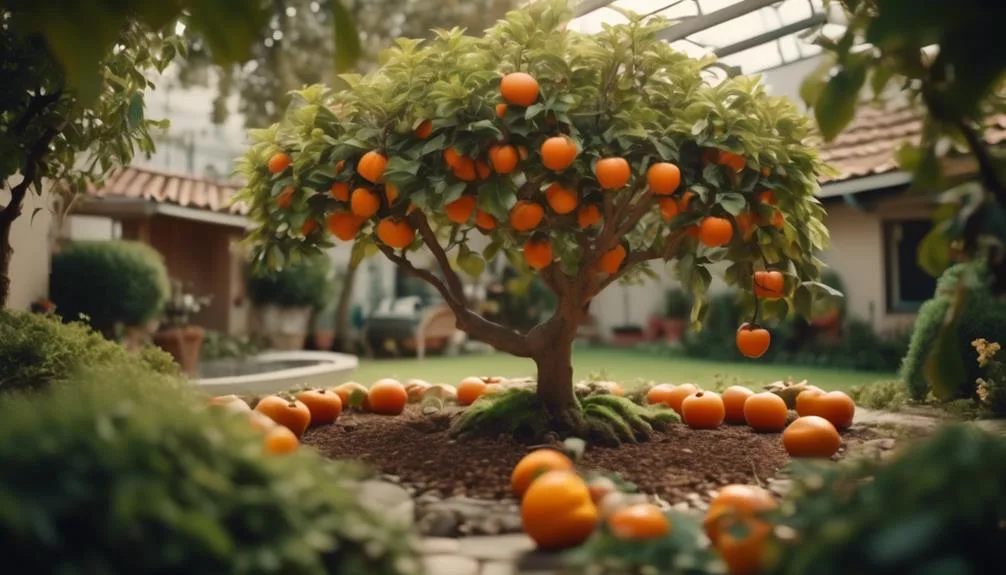If you've ever thought about adding a persimmon tree to your small garden, you'll be glad to know that it's possible. While persimmon trees are often seen in larger orchards, they can actually thrive in compact spaces.
But before you rush to plant one, there are important factors to think about. From space requirements to the best varieties for small gardens, there's a lot to consider to see if persimmon trees are a good fit for your space.
Key Takeaways
- Persimmon trees can be suitable for small gardens if proper space allocation and pruning techniques are employed.
- Compact varieties like 'Hachiya' and 'Fuyu' are recommended for small gardens due to their size and self-pollinating nature.
- Regular pruning and proper watering are essential for the health of persimmon trees.
- Potential challenges in small gardens include limited sunlight, intense root competition, and maintenance difficulties, but careful planning and proactive management can overcome these issues.
Space Requirements for Persimmon Trees
When planting persimmon trees in your small garden, ensure that you allocate sufficient space to accommodate their mature size and root system, allowing them to thrive and produce abundant fruit.
Persimmon trees can grow quite large, reaching up to 25 feet in height and spread, so it's important to plant them where they'll have room to flourish.
When considering the root system, keep in mind that persimmon trees have deep, aggressive roots that can cause issues with nearby structures or other plants. To manage this, you can utilize proper pruning techniques to control the size and shape of the tree, as well as to promote healthy growth.
Best Varieties of Persimmon Trees for Small Gardens
For small gardens, consider selecting compact varieties of persimmon trees that are well-suited to limited space while still offering flavorful and abundant fruit.
Dwarf varieties such as 'Hachiya' and 'Fuyu' are excellent choices for small gardens. These compact trees are well-suited for container gardening, making them ideal for patios, balconies, or small yards.
'Hachiya' persimmons are known for their sweet, honey-like flavor and are perfect for baking and drying. On the other hand, 'Fuyu' persimmons are non-astringent and can be eaten when still firm, with a sweet and crisp taste.
Both varieties are self-pollinating, making them convenient for small spaces. When choosing persimmon trees for your small garden, these dwarf varieties are sure to provide delicious fruit while fitting perfectly into limited planting areas.
Maintenance and Care for Persimmon Trees in Small Spaces
To ensure the health and productivity of your persimmon trees in small spaces, regular pruning and proper watering are essential.
When it comes to pruning techniques, focus on removing dead or diseased branches to maintain the tree's shape and encourage new growth. Trim back any branches that are crossing or overcrowding to improve air circulation and sunlight exposure. Additionally, consider thinning out the canopy to reduce the tree's overall size, making it more suitable for a small garden.
As for soil nutrition, it's crucial to provide your persimmon tree with well-draining soil enriched with organic matter. Regularly check the soil moisture and ensure it remains consistently moist but not waterlogged.
Potential Challenges of Growing Persimmon Trees in Small Gardens
Growing persimmon trees in small gardens presents unique challenges that require careful consideration and planning. When cultivating these trees, you may encounter the following potential challenges:
- Limited Sunlight: Small gardens often have limited sunlight due to neighboring buildings or trees. Persimmon trees require full sun for optimal growth and fruit production, so finding a suitable location with adequate sunlight can be a challenge.
- Root Competition: In a small garden, there may be intense competition for water and nutrients from surrounding plants. This can hinder the persimmon tree's growth and overall health.
- Space Constraints: Small gardens may not provide enough space for the extensive root system of persimmon trees, leading to root congestion and potential stunted growth.
- Maintenance Difficulty: Limited space can make it challenging to prune and maintain persimmon trees, which are essential for their health and fruit production.
Careful planning and proactive management are crucial to overcome these challenges and successfully grow persimmon trees in small gardens.
Benefits of Growing Persimmon Trees in Small Gardens
Even in small gardens, cultivating persimmon trees can bring an abundance of delicious fruit and a touch of natural beauty to your outdoor space. These trees are not only productive but also relatively low-maintenance, making them an ideal addition to your garden. Here are some benefits of growing persimmon trees in small gardens:
| Benefits | Details |
|---|---|
| Fruit production | Persimmon trees yield an ample harvest of sweet and flavorful fruit, providing a bountiful supply for you and your family. Proper pruning can enhance fruit production. |
| Soil conditions | Persimmon trees can adapt to various soil types but prefer well-draining, slightly acidic soil. Understanding your soil conditions is essential for optimal growth. |
| Watering techniques | These trees require regular watering, especially during dry spells. Maintaining consistent soil moisture is crucial for healthy fruit development. |
Growing persimmon trees in small gardens can be rewarding, offering both delectable fruit and aesthetic appeal to your outdoor oasis.
Conclusion
In small gardens, persimmon trees can thrive with the right care and variety selection. Despite potential challenges, these beautiful and fruitful trees can offer delicious fruit for you to enjoy.
Consider space requirements and maintenance, and don't overlook the benefits of growing persimmon trees in your small garden.
Happy gardening!

